By: Aisling Irwin
Send to a friend
The details you provide on this page will not be used to send unsolicited email, and will not be sold to a 3rd party. See privacy policy.
How will science and technology fare at the Rio+20 summit? Aisling Irwin looks at scientists' demands and assesses their chances.
Is this the last chance for scientists to save the planet?
The UN Conference on Sustainable Development — Rio+20 — enters its final phase of negotiations next week at a summit to be attended by more than 130 heads of state.
At stake is whether nations can overcome their differences to agree a new blueprint for sustainable development at a time of soaring population levels, environmental degradation and enduring poverty, as well as persistent economic crises.
Some groups simply want governments collectively to endorse the dominant arguments in their fields about how natural resources such as mountains, or human activities such as agriculture, should be directed and curated. Others want governments to sign up to concrete outcomes.The science and technology communities have been lobbying to get their concerns heard at Rio+20 and expressed in the final document that will emerge from the meeting. .
So what are they after — and how likely are they to get it?
Proclaim the environmental crisis
Top of the list of many vocal scientific groups is that nations should seize the opportunity to express collective alarm about the state of the planet's resources. It is a burning issue for the Science and Technology Communities Major Group (one of nine communities that have had official input into the negotiation process), which wants nations to admit that they cannot continue along current environmental paths.
To illustrate the mood of many scientists, the S&T Major Group said last year in a statement that the world has "reached a point in history at which a prerequisite for development — the continued functioning of the Earth system as we know it — is at risk".
The S&T Major Group had also sought to have the concept of 'planetary boundaries' acknowledged in the outcome document.
Planetary boundaries are a recent attempt to depict the pressures on the Earth's resources in an arresting but scientific way. The concept, developed by an international team of scientists led by Johan Rockstrom, of the Stockholm Resilience Centre in Sweden, describes quantitative limits to the Earth's resources, the transgression of which could cause irrevocable change. First aired widely in Nature in 2009, they include limits to the use of fresh water or the disruption of the phosphorous cycle, the depletion of ozone or the acidification of the ocean.
The idea was at one point included in the Rio+20 text but has since been discarded, partly due to concerns from some poorer countries that its adoption could lead to the sidelining of poverty reduction and economic development.
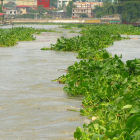
The idea of planetary boundaries neatly and quantitatively encapsulates Earth's troubles
Flickr/eutrophication&hypoxia
It is also, say observers, because the idea is simply too new to be officially adopted, and needed to be challenged, weathered and chewed over to test its robustness before standing a chance of being internationally accepted at UN negotiations.
But that leaves little in the latest version of the outcome document that would indicate to an outsider the level of concern in the scientific community. One has to read past page 50 to discover "profound alarm" about anything (the continued rise in the emission of greenhouse gases).
Accept the interconnectedness of resources
Some scientists have been working with economists and other analysts to develop the idea that we cannot exploit some of the Earth's resources without automatically imposing a cost on the others.
They argue that failure to recognise, for example, that growing biofuels for energy affects the availability of water and land for food can send many well-intentioned development programmes awry.
The UK's Royal Society 'People and Planet' report, published in April this year, talks of a nexus between food, water and energy, while the 'European Report on Development 2011-12' highlighted a similar 'water-energy-land nexus'.
These connections may seem obvious but people and organisations tend to tackle problems such as sourcing more energy or producing more food in isolation from each other.
The authors of these reports want the new, 'joined-up' thinking reflected in the Rio+20 agreement. Currently the nearest expression of this is, again, far down the text in a section addressing climate, which says there is a "need to better understand and address cross-cutting issues and interlinkages, including those among water, energy, food, health, ecosystems and climate change".
"In this regard," the draft text continues, "we welcome initiatives and partnerships aimed at achieving synergies and minimising conflicts among policy objectives".
Nevertheless, the wider idea that the challenges that achieving sustainable development pose require integrated approaches does permeate the document.
Acknowledge the importance of S&T
Scientists are also demanding an assurance that governments see S&T as crucial to solving current problems.
After all, remarks Alice Abreu of the International Council for Science, science was mentioned in every chapter of Agenda 21, the blueprint for sustainable development that emerged from the first Rio conference in 1992.
There is text fairly early in the current document, although it remains – like most paragraphs – vulnerable to revision, that recognises "the important contribution of the scientific and technological community to sustainable development".
The document then continues "We are committed to working more closely with academia and the scientific and technological community in all countries, in particular in developing countries, to strengthen the science–policy interface as well as to foster sharing of knowledge and information, and international research collaboration".
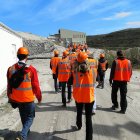


Technology is a result of engineers applying knowledge developed by science, says Jorge Spitalnik of WFEO
Flickr/Engineering at Cambridge
But where, complains the World Federation of Engineering Organisations, is the commitment to working with engineers, who turn S&T into useful solutions?
Science in the green economy
At the heart of the Rio+20 talks lie two themes: the green economy and the institutional framework for sustainable development. A green economy is, according to the United Nations Environment Programme (UNEP), one that "results in improved human well-being and social equity, while significantly reducing environmental risks and ecological scarcities". But the concept is regarded in some quarters as a licence for the private sector to take control of natural resources and turn them into tradeable commodities.
Scientists have been working with economists for some years towards putting a price on natural resources — or, put another way, pricing the full cost of their destruction — in the hope that an appreciation of such values will lead to them being used more wisely.
The Economics of Ecosystems and Biodiversity study (TEEB), funded by UNEP, has costed resources such as the pollination services of bees and the coastal defence services of mangroves.
In recent years, both governments and individual communities have begun to use such accounting to inform decision-making. Examples of this include finding a way for rural communities to charge for protecting the habitat they live in, rather than destroying it for income.
Now the World Bank is pushing this approach through its Wealth Accounting and the Valuation of Ecosystems Services (WAVES) programme and hopes to persuade 50 companies and 50 countries to sign up at Rio+20.
There is pressure on the Rio+20 meeting to endorse similar approaches that can go beyond GDP, which merely measures economic activity — and does so whether the activity is environmentally and socially destructive or not.
New indicesof development have been developed by scientists and social scientists in recent years and will be displayed at Rio+20. One example is the Inclusive Wealth Index (IWI), spearheaded by the UN University's International Human Dimensions Programme (IHDP) which measures nations on three aspects — natural, human and produced capital.
So will the concept of 'GDP+' move nations at Rio+20? The draft outcome document currently recognises the importance of such efforts and there are signs that countries may undertake to start developing and testing them.
Science and Sustainable Development Goals
As a way of directing development onto a greener path, the Rio+20 meeting looks likely to agree to establish a structure for setting Sustainable Development Goals (SDGs), which could become the successors to the Millennium Development Goals.
This idea has the support of many in the science and social science communities who believe the SDGs could be 'smart' ways of tackling the three pillars of sustainable development — economic, social and environmental — as an integrated whole.
There is plenty of debate, however, on the desirability of such goals and how they would be conceived.
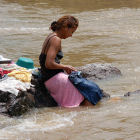


Sustainable Development Goals might have economic, environmental and social components
Flickr/ One Drop Foundation
But, from a technical point of view, the data are ready, say campaigners — scientists have done the work and are ready to go. And scientists will also be campaigning for access to the committee that takes SDGs forward.
Science in the institutional framework
Along with the green economy, redrawing the 'institutional framework' so it is more fit for the purpose of driving sustainable development is the second theme of the Rio+20 meeting.
Scientists have been part of this debate. Earlier this year a group of eminent scientists published an article in Science arguing that extensive institutional reform is the only route out of the environmental crisis.
The 30 researchers had reviewed the governance of the environment and sustainable development — and found it wanting.
They called for the "the largely ineffective and politically paralysed" UN Commission on Sustainable Development, which was formed to ensure that the original Rio meeting in 1992 was followed up effectively, to be replaced with a high-level council that would answer to the UN General Assembly.
A Sustainable Development Council would have new, strong powers that would allow it to deal more effectively with climate, food security, water, natural disasters and energy, and the links between them.
A proposal for such a council is in the current draft of the outcome document, a concrete prize that could emerge from Rio+20. One of its goals, in the current text, would be to strengthen the science–policy interface.
Another, controversial shake-up of international governance might come in the form of the strengthening of the UNEP, which at present lacks sufficient power to drive forward the international environmental agenda, for example by helping to set, and enforce, international regulations.
While some want to see the programme elevated to full agency status, it is more likely that a compromise will be agreed in which UNEP's governing council may gain universal membership of all UN member states, among other possible measures.
This is a divisive issue that split the G-77 group of developing countries plus China, providing some drama during the late April round of Rio+20 negotiations.
The science–policy interface
The latest Rio+20 text argues that UNEP would, in its new role, strengthen the science–policy interface, disseminate environmental information and build capacity so that countries can access relevant technologies.
The enduring quest of scientists to strengthen their access to policymakers has been sharpened by the environmental failures of the past 20 years and is central to the S&T Major Group's desired outcomes from Rio+20. There are seven mentions of the importance of the science-policy interface in a recent version of the text. But a high-level panel, as described above, might be one way of actually achieving progress, as might a strengthened UNEP.
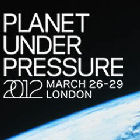


UN secretary general Ban Ki-Moon told the Planet Under Pressure meeting he was "taking forward" recommendations on a science advisor
Planet Under Pressure
A chief science advisor for the UN secretary-general, or a high-level scientific advisory panel, would also help. Ban Ki-Moon, the UN secretary-general, announced at the Planet Under Pressure meeting in London earlier this year (26–29 March), that he is "taking forward" a recommendation from his High-Level Panel on Global Sustainability to appoint one of these.
Another route for science advice, also promoted in the current outcome document, would be for scientists to produce regular 'state of the planet' reviews.
Funding for a new science
A seismic shift is gripping parts of the science community as first agricultural research, and now global change research, are reinvented as multidisciplinary, problem-oriented, global collaborative fields.
There is a growing chorus of global change scientists arguing that the problems ranging from environmental destruction to food insecurity and lack of access to safe water are systemic and can therefore only be solved systemically, by scientists crawling out of their disciplinary burrows and working together and with other stakeholders.
Indeed they are already doing this and will launch Future Earth — one such collaboration — during Rio+20.
The S&T Major Group wants this acknowledged through a commitment from nations at Rio+20 that they will invest more in international research programmes. There is little sign of such an undertaking, though the Belmont Forum, a significant group of research funders, which announced changes in funding policy that support this philosophy last March.



Geoengineering gets little mention so far in the Rio document
Flickr/Steve H
Technology assessment
Nanotechnology, synthetic biology and geoengineering are just three of the new technologies that promise to fix some of our biggest social and environmental problems but run the risk of causing damage in the process.
Some scientists and campaign groups have been arguing for internationally agreed measures that give countries, particularly developing countries, access to independent and thorough assessments of new technologies prior to their implementation so they can make informed decisions on their adoption.
Better regulation of new technologies might also direct the private sector down a greener path, argues the group of 30 scientists mentioned above.
But the text so far does not meet these demands, merely stressing the importance of "strengthening international, regional and national capacities in technology assessment and, where necessary, regulatory regimes".
And geoengineering — the attempt to halt global warming through acts of radical engineering — is barely mentioned, apart from a commitment not to carry out ocean fertilisation (the addition of iron to the ocean to cause plankton blooms that store carbon) until the procedure has an "adequate scientific basis", and that only "legitimate scientific research" on the topic should be allowed.
Technology transfer
Many frustrated nations called in their Rio+20 submissions for a mechanism that will translate the desire to get useful technologies to developing countries into concrete action. In fact, the need for more cheap, green technologies is seen by many as the chief obstacle to reducing carbon emissions. Some have requested a mechanism that would be modelled on recent efforts by the UN Framework Convention on Climate Change (UNFCCC).
The International Centre for Trade and Sustainable Development (ICTSD), which has been tracking Rio+20 submissions on technology transfer, has itself proposed a Global Green Innovation and Technology Partnership to galvanise efforts, knowhow and resources to accelerate the diffusion of green technologies on a world scale.
The Rio+20 agreement currently resolves to ask the UN system to report back on options for an appropriate mechanism to help disseminate clean technologies to developing countries — and highlights the UNFCCC technology mechanism "and in particular the on-going implementation of the new global Climate Technology Centre and Network" as "highly relevant" in this regard.
The text currently also agrees to enhance international collaborative research to address global challenges by developing solutions that are accessible to developing countries, and particularly to least developed countries. These include environmentally sound technologies and the establishment and networking of centres for technology transfer.
Natural resources and ecosystems
Mountains, forests, deserts and oceans all have their own research communities jostling for attention at Rio+20. But the S&T Major Group has shied away from putting too much emphasis on these causes in the belief that its limited firepower should be aimed at creating better political access for science in general.
Oceans
Scientists have over the past 20 years revealed much about the biodiversity of the deep ocean, its genetic resources, and the ways in which it influences what happens closer to shore. There has also been a new wave of research on ocean acidification and its potential effect on marine food sources.
Ocean campaigners have seized this research to argue that Rio+20 should push forward an agreement on managing the high seas and also for a global acidification monitoring system.
Energy
The final text is likely to contain broad recognition of, and support for, cleaner energy-efficient technologies; energy efficiency; and the promotion of energy technology research and development in developing countries.
Some campaigners want explicit commitment to Ban Ki Moon's Sustainable Energy for All initiative (SE4All) in the belief that this would help drive innovation and, crucially, the roll-out of technologies such as efficient cooking stoves and solar power. Currently the initiative is admired in the text but there are no commitments.
Forests
Forest researchers held extensive consultations on Rio+20 via their umbrella organisation, the International Union of Forest Research Organisations (IUFRO). They want Rio+20 to recognise the "critical importance" of forests and are calling for "new institutional arrangements … in order to strengthen policy learning and problem solving among diverse stakeholders (such as policymakers, practitioners, scientists, local communities and indigenous peoples, and civil society)".
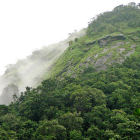


Forest researchers want the "critical importance" of forests recognised at Rio+20
Flickr/wildxplorer
Biodiversity
Years in the making, the Intergovernmental Science-Policy Platform on Biodiversity and Ecosystem Services (IPBES) was finally launched in April. The Rio+20 text currently welcomes this and calls for "an early commencement of its work" — which is to provide policymakers with scientific assessments on a range of sustainability issues, in a similar fashion to the way that climate change policy has been guided by the Intergovernmental Panel on Climate Change.
Food
The potent issue of food security concerns nearly every community, but agricultural researchers say they struggled even to get a mention in the relevant section of the Rio+20 document. A seven-point plan for Rio+20 was published last month (23 May) by the global research partnership, the Consultative Group on International Agricultural Research (CGIAR).
Agricultural research leaders such as Bruce Campbell, director of the CGIAR climate programme, argue that we will only manage to feed the poor sustainably when the focus broadens to include all the stages in the chain — distribution, storage, consumption, nutrition and waste as well as environmental components such as land, health, water, biodiversity and greenhouse gases.
CGIAR is calling for this integrated view of agriculture to be recognised in the Rio+20 document. It also wants governments to fund more research.
The outcome …
Whether scientists, engineers and technologists achieve what they want in the Rio+20 document or not, that is not their only line of attack. Many groups are holding events at Rio+20, hoping to take advantage of the presence of government delegations to secure national, regional and city-level commitments.
And this week, in the build-up to Rio+20, science, social science and engineering communities are meeting with government representatives to discuss how they can slot into the post-Rio+20 agenda.
Whether these communities are successful in getting their messages across – inside or outside the official Rio+20 process – and whether, if they are, this increases the potential for science and technology to achieve sustainable development — remains to be seen.
Link to Navigating the Anthropocene: Improving Earth System Governance
This article is part of our coverage on Science at Rio+20. Read more in our live blog.
References
Science doi: 10.1126/science.1217255 (2012)













